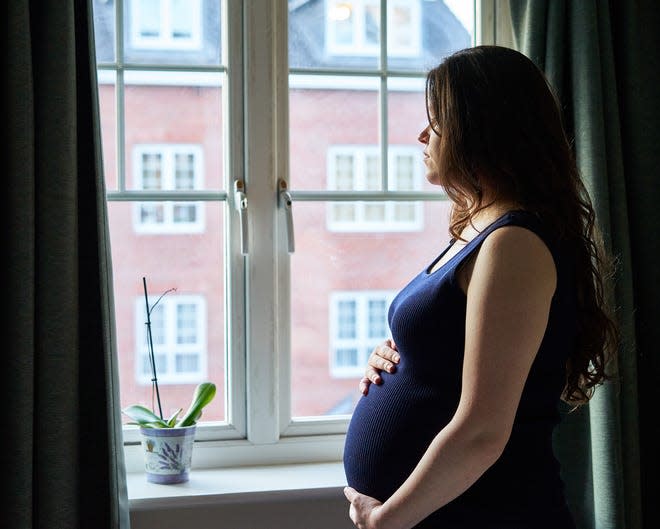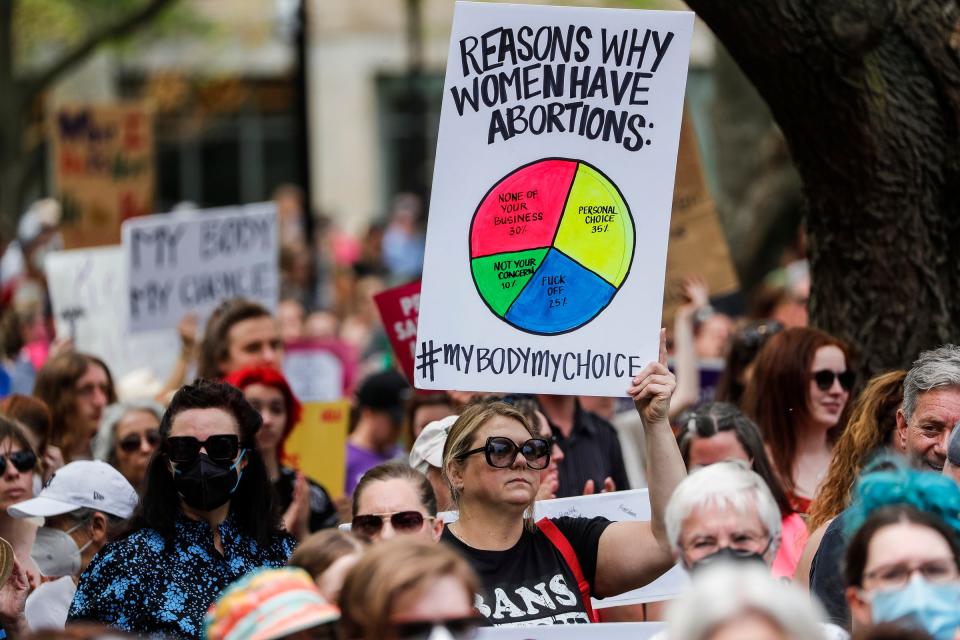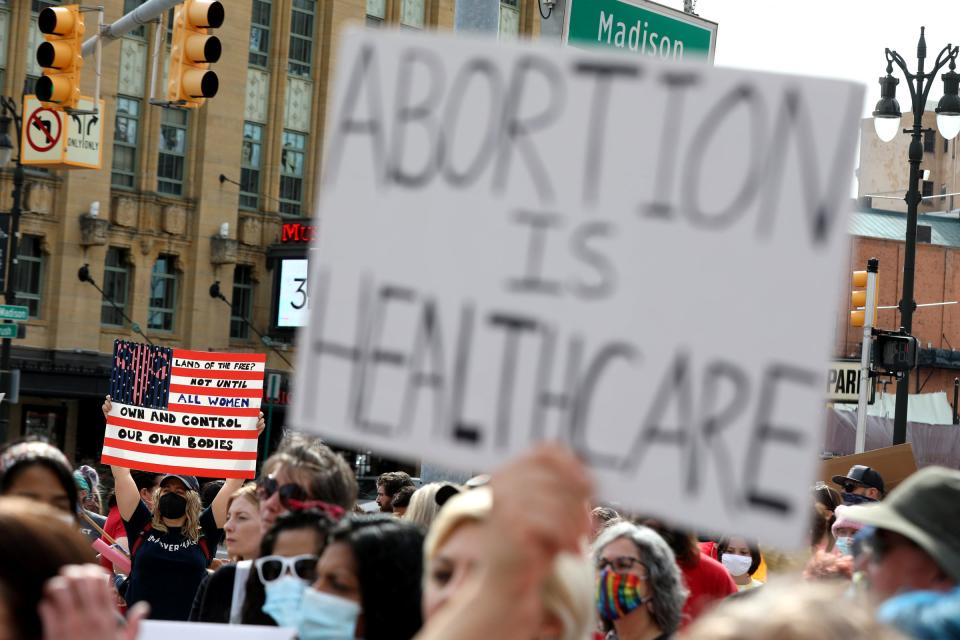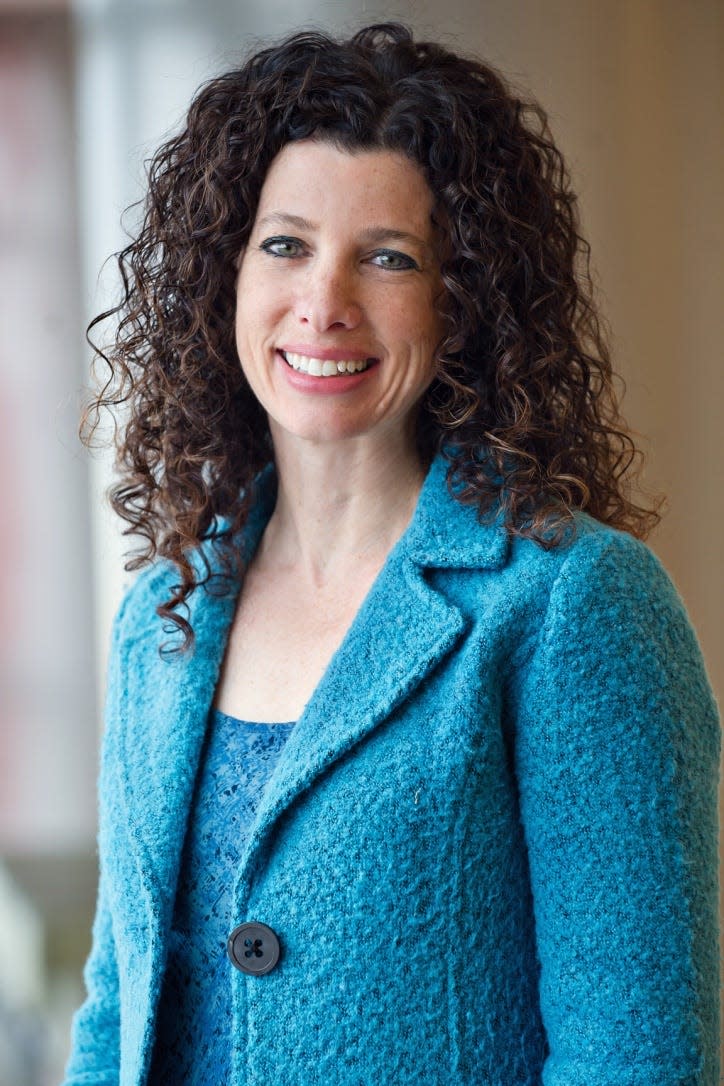Opinion: I'm an ob-gyn. We're not ready for what will happen if Roe is overturned.





I’ve been an obstetrician-gynecologist for 24 years, caring for women giving birth, experiencing miscarriage, and deciding to have abortions. Most patients I see have experienced some or all of these events, at different times in their life.
Since abortion is so politicized and stigmatized, it’s often hard to see that it usually coexists alongside birth and miscarriage in many women’s lives, and in the medical practices of their doctors.
I became an ob-gyn to offer compassion and expertise across all these reproductive experiences; I hope my patients have felt that. I didn’t go into medicine to be part of political debates. But I am acutely aware that such debates impact the women and families I care for.

Indeed, as we wait for the outcome of the Supreme Court’s upcoming abortion decision, my colleagues and I are trying to plan ahead for all of the ways the healthcare landscape in Michigan may dramatically shift — not only for women who might seek abortion care, but also for those whose pregnancies end in miscarriage, or for anyone who continues a pregnancy, as well.
Many Michiganders don’t realize we have a 1931 abortion ban on the books. It is among the strictest in the country, permitting abortion only to “preserve the life” of a pregnant woman. The U.S. Supreme Court’s 1973 Roe v Wade decision made it unenforceable, determining abortion is a Constitutional right.
More: Opinion: Michigan's economy headed for disaster if abortion is criminalized
More: Michigan woman: Hear my story, feel my pain before outlawing abortion
But if Roe is reversed in June, as a draft opinion suggests is likely, our ban will become enforceable, and abortion will be a crime again in Michigan, impacting thousands of women from every walk of life.
Lawsuits brought by Gov. Gretchen Whitmer and Planned Parenthood of Michigan aim to stop the 1931 ban from being enforced, should Roe fall. Last week a Michigan judge temporarily blocked the ban from coming into effect, pending the final outcome of the Planned Parenthood case. Those following abortion headlines may see the legal back-and-forth as partisan or political wins or losses.
But as a doctor in Michigan, I see it as a healthcare issue.
Bracing for tumult
Alongside my physician, nurse and midwife colleagues at Michigan Medicine, we are getting ready for the possibility that abortion will become illegal in Michigan.
Myriad preparations are needed. We are not yet ready, nor are our healthcare colleagues statewide.
First, we need to determine what, precisely, “life-preserving” abortion means.
What must the risk of death be, and how imminently? I have performed abortions on critically ill patients in intensive care units, where it is clear abortion is life-saving.
More: Whitmer to Michigan Supreme Court: 'Time is of the essence' on abortion lawsuit
More: University of Michigan forms task force to 'mitigate the impact' of possible abortion ban
Pregnancy demands so much from all body organ systems, especially heart and lungs; sometimes ending a pregnancy is the only way to help a patient survive. But outside of these situations, it gets unclear.
Maternal-fetal medicine specialists care for patients with a range of “high-risk” conditions. For patients with pulmonary hypertension, they may cite a 30% to 50% chance of dying with ongoing pregnancy.
Is that high enough to permit abortion? Or must it be 100%?
When oncologists diagnose cancer during pregnancy, some patients end the pregnancy to start treatment immediately; some cancers advance faster due to pregnancy’s extra hormones, and chemotherapy and radiation can cause significant fetal injury.
Will abortion be permissible in this situation, or must patients delay cancer treatment and give birth first? When patients have advanced cancer that was preventable with earlier treatment, increased risk of death may be a few years away.
We’ve identified many similar questions.
Just three options
Most pregnant patients seeking abortion care are not facing life-threatening conditions, and will have only three options: travel outside Michigan for abortion care, self-manage an abortion, or give birth. At Michigan Medicine we are preparing for all of this.
People with enough money and support will seek care out-of-state. For most Michiganders, this means driving to Illinois, making the average travel distance for abortion care more than 260 miles if our ban is re-enacted. This will be impossible for many, since lack of financial resources is why many women seek abortion care.
Nationally, half of patients seeking abortions live on incomes under the federal poverty level; another 25% live on just one-to-two times that.
Many cannot afford gas, tolls, hotels. They cannot afford to lose hourly wages or will be fired for missing work.
Most patients I see are already parents. Travel is much harder when you need childcare arrangements, too, especially overnight.
I’m thinking of a patient I saw not long ago, who worked the night shift, drove several hours to her abortion appointment, three children in tow, and then afterwards headed home for another night shift. Efforts like this are already the norm in abortion care, and it will only get harder.
Nevertheless, if legally permissible, our Michigan health system will need to assist those who can travel.
If allowed, we can offer referrals out-of-state and pre-travel “teeing-up.” This may include ordering an ultrasound or bloodwork and, for patients with underlying illnesses, speedy specialist consultation to ensure they can safely receive care on arrival. We must figure out if Illinois medical centers have capacity to see our patients requiring hospital-level care, knowing these hospitals will also be seeing patients from Ohio, Missouri, Indiana and other states.
Insurers will need to decide if out-of-state abortion care and associated travel expenses are covered, and patients will likely find themselves battling with insurers for such coverage, which may require costly out-of-network fees.
Will legal hazards magnify distrust?
The second option is self-managed abortion.
For over twenty years, people have safely used the FDA-approved mifepristone and misoprostol combination to end pregnancies at home, after receiving medications in a doctor’s office. Mifepristone and misoprostol obtained online from the many available, reliable sources are equally safe and effective.
However, patients without internet access, a credit card, or who don’t know about those medications may use ineffective or deadly methods: ingesting poisons, intentional trauma like falling down stairs, or putting objects into their uterus to disrupt pregnancy.
My colleagues and I will want to steer people toward safe methods, though it’s unclear Michigan’s law will permit such education.
Emergency department and primary care practitioners will need to quickly become familiar with treating abortion complications in this landscape, including complications not seen since before Roe, nearly 50 years ago.
Because mifepristone and misoprostol are so safe, legal risks may be the more serious ones for patients — meaning the people they turn to for medical care might report them, or loved ones who helped them, to police, even though that violates current privacy laws and Michigan doesn’t require reporting of suspected self-managed abortion.
Indeed, all patients who have bleeding in pregnancy or experience pregnancy loss may be vulnerable to criminal prosecution because miscarriage and self-managed abortion are virtually indistinguishable. National data show that healthcare providers disproportionately report Black pregnant patients and those living on low incomes to police.
More babies will strain pre-natal care
Third, more people will give birth. Based upon projections of who will travel or self-manage abortion, we anticipate a 5% to 17% birth increase in Michigan.
We already have significant maternal healthcare deserts — places without prenatal or birth care — where patients travel far distances to deliver.
It’s not clear how a greater need will be met.
Our own hospital’s labor and delivery unit is already at capacity from COVID birth surges.
When we work over capacity, all birthing patients are affected, not just those who might otherwise have ended their pregnancies.
Newborn and pediatric care needs will increase, too. Many families who get terrible news about their developing baby will be forced to give birth, and those babies and children will need complex, costly medical care, and often a lifetime of specialized support.
More than ever, families statewide will need robust medical and social safety nets that may not exist.
We can expect mental health care needs in pregnancy to intensify, as girls and women continue undesired pregnancies, including those resulting from rape and incest.
Michigan’s abortion ban makes no exceptions for either. Our already-overburdened mental healthcare system is unlikely to adequately meet this need.
Mothers will die
Finally, maternal mortality will increase — as much as 21% overall by one demographer’s estimate — because abortion is safer than childbirth. Centers for Disease Control data show that in the U.S., the risk of dying from childbirth is 50 to 130 times greater than dying from abortion.
This new burden of maternal death will not be felt equally in Michigan, or anywhere in the country, because Black women are more than twice as likely as white women to die from pregnancy and childbirth.
Maternal mortality for white women is projected to increase by 13%. For Black women, the projected increase is 33%, meaning that an abortion ban will disproportionately harm Black women and the families who lose them. It will become more pressing than it already is to remedy systemic inequities and racism that generate such disparities.
Unsafe abortion will add to this burden and loss.
Other reproductive healthcare will be impacted, too.
Fearing criminal prosecution, doctors may hesitate to treat ectopic pregnancy, hemorrhage or serious infection from miscarriage, when fetal cardiac activity remains.
Healthcare providers will need to decide whether they’ll continue prescribing the best evidence-based medications for miscarriage — mifepristone and misoprostol.
Since those medications are used in abortion care, doctors may fear their use carries legal jeopardy. Infertility doctors may stop providing in vitro fertilization given the potential for embryo loss in IVF.
We're not ready
Re-enactment of Michigan’s abortion ban will affect medical education. Abortion training is an accreditation requirement for ob-gyn residencies.
Michigan Medicine will need out-of-state training arrangements. Ultimately, our top-ranked program may cease to draw talented applicants. Roughly 40% of our ob-gyn graduates stay in Michigan to practice medicine, so the statewide reproductive health workforce may be impacted.
Patients will ultimately feel the impact of shifts in abortion training: If residents can’t learn "non-lifesaving" abortion care, soon no one will be trained to perform the "lifesaving" abortions Michigan’s 1931 ban permits.
Patients experiencing miscarriage will feel the loss of abortion training, too, because doctors who have such training are more likely to offer patients the full range of appropriate miscarriage treatments than doctors without it.
Finally, Michigan’s health system workforce, like those everywhere, is disproportionately female. When more of the workforce is pregnant, on parental leave, or traveling for abortion care, patients will likely feel the impact.
All of this is my way of saying that we are not yet ready to manage what is coming if abortion becomes illegal in Michigan.
Every morning I wake up with another new question. Those who view abortion exclusively as a political or partisan issue, maybe one they’d like to avoid, will soon see that abortion care, or lack thereof, is a healthcare and health equity issue that impacts everyone.
I trust my patients
Avoiding this issue isn’t possible.
Amid the flurry of logistical planning, I remain aware that abortion is complex and emotional topic for many.
That makes sense. Abortion asks us to hold two opposite things at the same time: Abortion means a baby won’t be born, and that is weighty. Banning abortion means that a girl or woman must continue a pregnancy and give birth when she can’t or doesn’t want to, shifting the course of her, and her family’s, lives. That is weighty, too.
In our polarized times we don’t really learn how to hold complexity like this. Instead we are asked to resolve our feelings one way or another, even when “pro-life” or “pro-choice” boxes may not precisely fit how we feel.
From the hundreds of times my patients have shared their lives, hopes, and hurts, I know they hold this complexity, too, as do I.
Ultimately, I trust my patients to know what they and their families most need.
My colleagues and I will continue to provide support as the legal landscape shifts, even if we don’t yet know exactly what the contours of that support will look like.
Lisa Harris, MD, PhD, is a professor of obstetrics and gynecology and professor of women's and gender studies at University of Michigan.
This guest column is adapted from an essay recently published in the New England Journal of Medicine.
This article originally appeared on Detroit Free Press: Opinion: Michigan hospitals aren't prepared for end of Roe v. Wade

